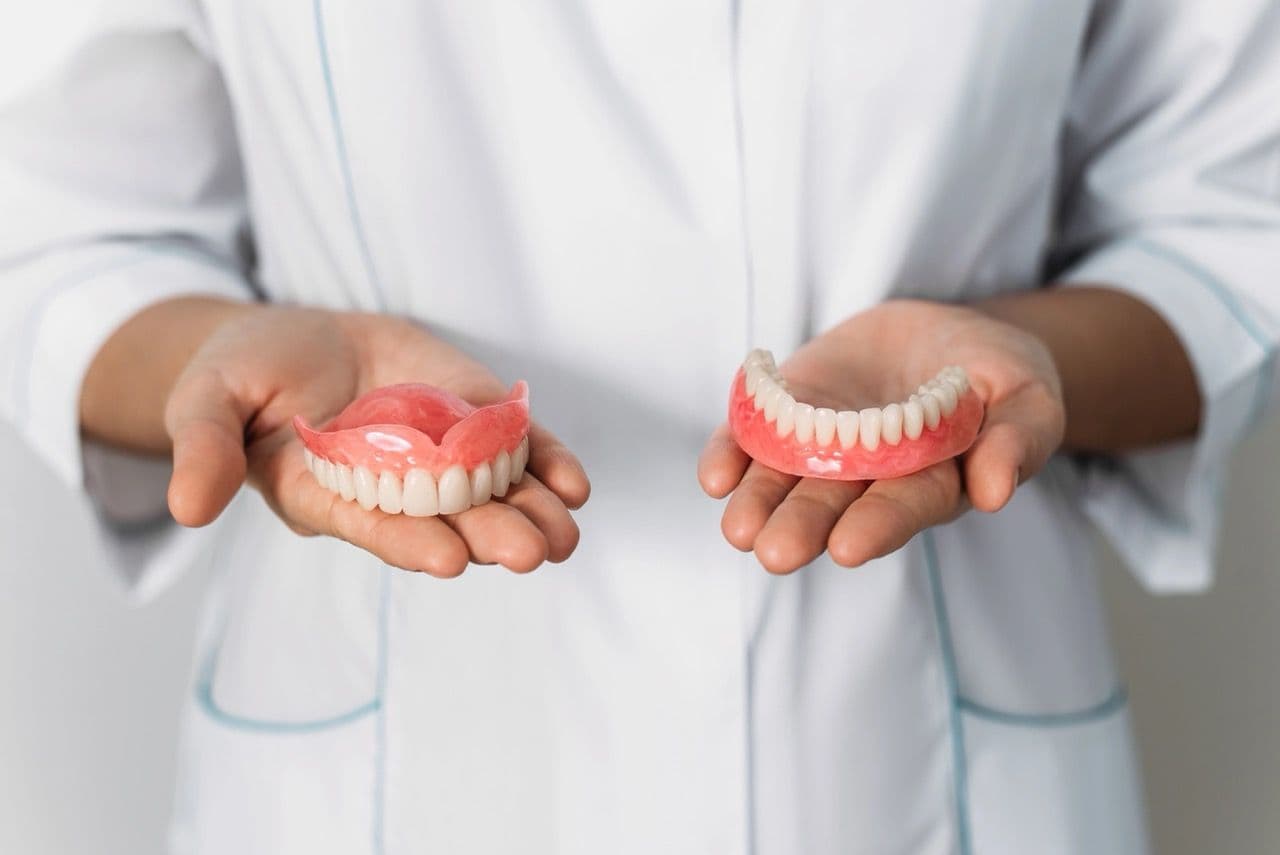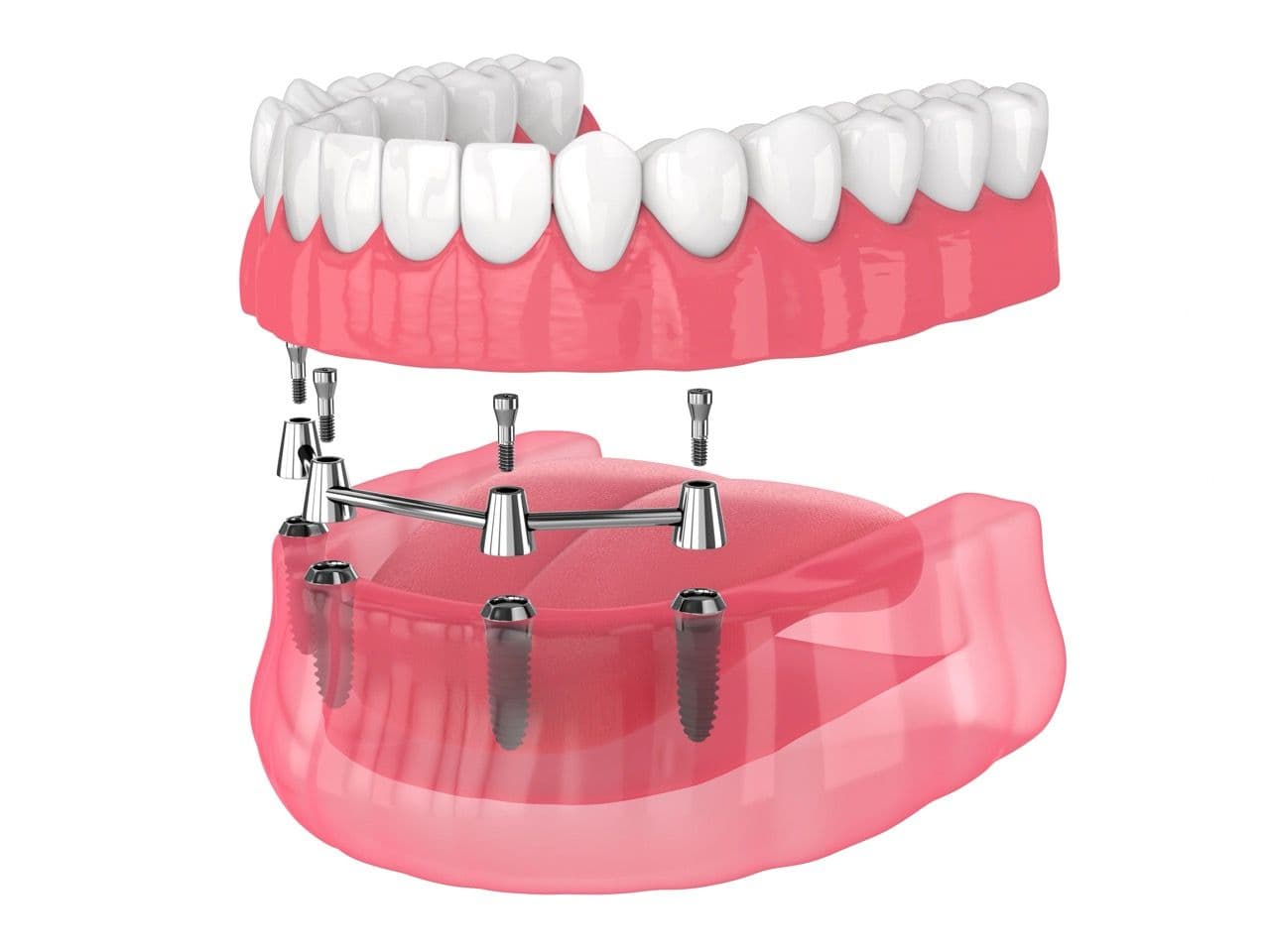Did you know that over 17% of adults in the U.S. aged 65 and older have lost all their teeth?
Dentures are one of the most common tooth replacement options - with partial dentures a popular option for those who have not lost all their teeth. For the millions of Americans who wear dentures, adjusting to them can be challenging.
Adjusting to lower dentures can be more challenging than upper dentures. Here's why:
- Upper Dentures: These stay in place with suction, providing a secure and stable fit.
- Lower Dentures: Unlike the upper set, lower dentures rely on gravity, which often makes them feel less secure.
Additionally, learning to control your tongue around lower dentures can take time and practice, adding another layer of difficulty to the adjustment process.
In short, the combination of reduced stability and tongue coordination makes lower dentures harder to get used to than upper dentures. If you're struggling with the fit of your dentures, Affordable Dentures & Implants offers expert services to adjust or replace your dentures, ensuring a more comfortable fit.

Common Issues with Lower Dentures
If you’re new to wearing dentures, it will take time and patience to get used to them. Your mouth uses different muscles to chew with dentures compared to natural teeth. To make the transition easier, our new denture wearer package offers significant savings and comprehensive care, providing everything you need to comfortably adjust to your first set of dentures.
Some patients will experience issues with lower dentures such as:
- Difficulty speaking or chewing
- Looseness and slippage
- Excess saliva
- Misalignment
- Gum irritation
- Discomfort or pain
- Infection
If your dentures don’t fit properly, they can cause chronic irritation that leads to inflammation, ulcers, and infection. It’s essential to fix these problems immediately by visiting your dentist.
Dentures and Bone Loss
One possible reason for a poor fit is bone loss. Without the roots of your teeth in your jawbone, your body will begin to reabsorb it, resulting in bone loss over time, causing the shape of your face and jaw to change. As a result, your dentures may not fit as well as they did previously.

Solutions to Denture Problems
Denture adjustments and relining can correct ill-fitting dentures by reshaping them to better fit the contours of your gums. Every jaw has a unique shape and size, so the dentures need to be customized to fit your mouth. Tooth loss can lead to continuing changes to the shape of your jaw, even months after the loss of the tooth, so it’s very common for dentures to need regular adjustments or relining.
Hard Reline
A hard reline shapes the base of the dentures using an acrylic material. This material is long-lasting but may not be ideal if you have sore or sensitive gums. Hard relines are best if you don’t require frequent adjustments and want a firm grip.
Soft Reline
Soft relines use a pliable rubber material that is more comfortable for sensitive and sore gums. The soft lining is often used following tooth extraction but doesn’t last as long as a hard reline. In addition, soft relines have a weaker bond with the gums.
Denture Adjustments
If your dentures are creating pressure points, pinching, irritation, or discomfort, your dentist may need to adjust the shape or thickness for an optimal fit. Sometimes, a small denture adjustment can greatly improve the comfort and suction of your dentures.
We offer free denture adjustments for up to 60 days after your treatment to help you get used to your new dentures and make sure they fit you perfectly.
New dentures may be necessary if you’ve had them for more than five years, or if you have chronic inflammation. If there are significant changes in your jaw alignment, you may need to get new dentures to ensure a proper fit.

How to Get Used to Wearing Dentures
On average, most people need about 4 weeks to get used to wearing dentures. Here are a few tips for new denture wearers to help make the transition smoother:
- Wear your dentures all day – Wearing your dentures all day helps your mouth get used to the feeling of them in your mouth. The more you wear them, the more your body adapts to them.
- Remove and clean your dentures every night- Remove your dentures every night and soak them in a cleaning solution. Keeping them clean helps maintain your oral health and gives the muscles in your jaw time to relax. Your gums also need exposure to the air to prevent bacteria buildup.
- Manage excess saliva – Initially, dentures can stimulate the production of excess saliva. Stay hydrated by drinking plenty of water, and try to swallow more frequently. Your saliva levels will return to normal with time.
- Take smaller bites – Chewing with dentures can feel tricky at first because they take up more space than natural teeth. Start with small bites as you get used to eating with less space in your mouth. Choose soft foods at first and wait to eat crunchy, chewy, or stringy foods until you feel more confident.
- Have patience – Your mouth muscles need time and practice to adapt to using dentures. With daily use, your dentures will feel more comfortable.
Minor soreness is common when you first start wearing dentures. But persistent soreness or pain requires treatment. If your dentures are hurting your mouth, it’s important to remove them and schedule an appointment with your dentist.

Types of Dentures
Partial Dentures
If you have some remaining natural teeth in your lower arch, partial dentures can be a great option. They can be made from a variety of materials, either using a cast metal framework, soft plastic used in flexible partial dentures or affordable and easily adjusted acrylic partial dentures. Partial dentures can help keep your natural teeth in place, stopping them shifting in your jaw.
Full Dentures
For patients who are looking for a replacement for their whole set of lower teeth, we have a range of full dentures available. Our RealFit3D dentures use 3D printing technology to create custom-made dentures that are designed to perfectly fit your mouth - and they are also available for same-day service.
Both full and partial dentures are suitable for relining and adjustments. Whatever type of dentures you wear, Affordable Dentures & Implants can refit them, restoring the look and feel and making you feel comfortable wearing them again.
Denture Alternatives
If you’re considering long-term alternatives to traditional dentures, there are several options that use the support of dental implants. Depending on your individual circumstances, your dentist may recommend fixed implants for some or all your teeth. One key advantage of implants over dentures is that they help protect the jawbone from being reabsorbed into your body, as the implants in your jaw replace the roots of your natural teeth.
Snap-in Dentures
Implant supported dentures also known as snap-in dentures or SNAPSecure dentures, provide a firm grip for removable teeth using titanium implants in the jawbone. The surgical implants create an anchor to prevent teeth from moving around.
All-In-One Solution
Our All-In-One dental implants are highly suitable for people who are looking to replace the bottom arch of their teeth. A full row of natural looking prosthetic teeth are attached to four titanium screws implanted into your jaw.
Mini Dental Implants
Mini dental implants are ideal for patients with severe bone loss in the jaw. Compared to regular dental implants, mini implants use a smaller titanium rod and have a shorter recovery time. For some patients, mini dental implants can be a more affordable and practical option than regular implants.
Need a Solution to Your Lower Denture Problems?
Affordable Dentures & Implants can help you find fast and permanent solutions to your lower denture problems. We offer a wide range of personalized dental solutions to meet your unique needs. Visit an Affordable Dentures & Implants location near you to schedule a consultation today.
Sources
https://www.nidcr.nih.gov/research/data-statistics/tooth-loss/seniors
![[object Object]](/_next/image?url=https%3A%2F%2Fcdn.sanity.io%2Fimages%2Fw75voqed%2Fproduction%2F537eccc4c695d6163f1353e45f97379fe6e50b75-8192x5464.jpg&w=3840&q=75)
